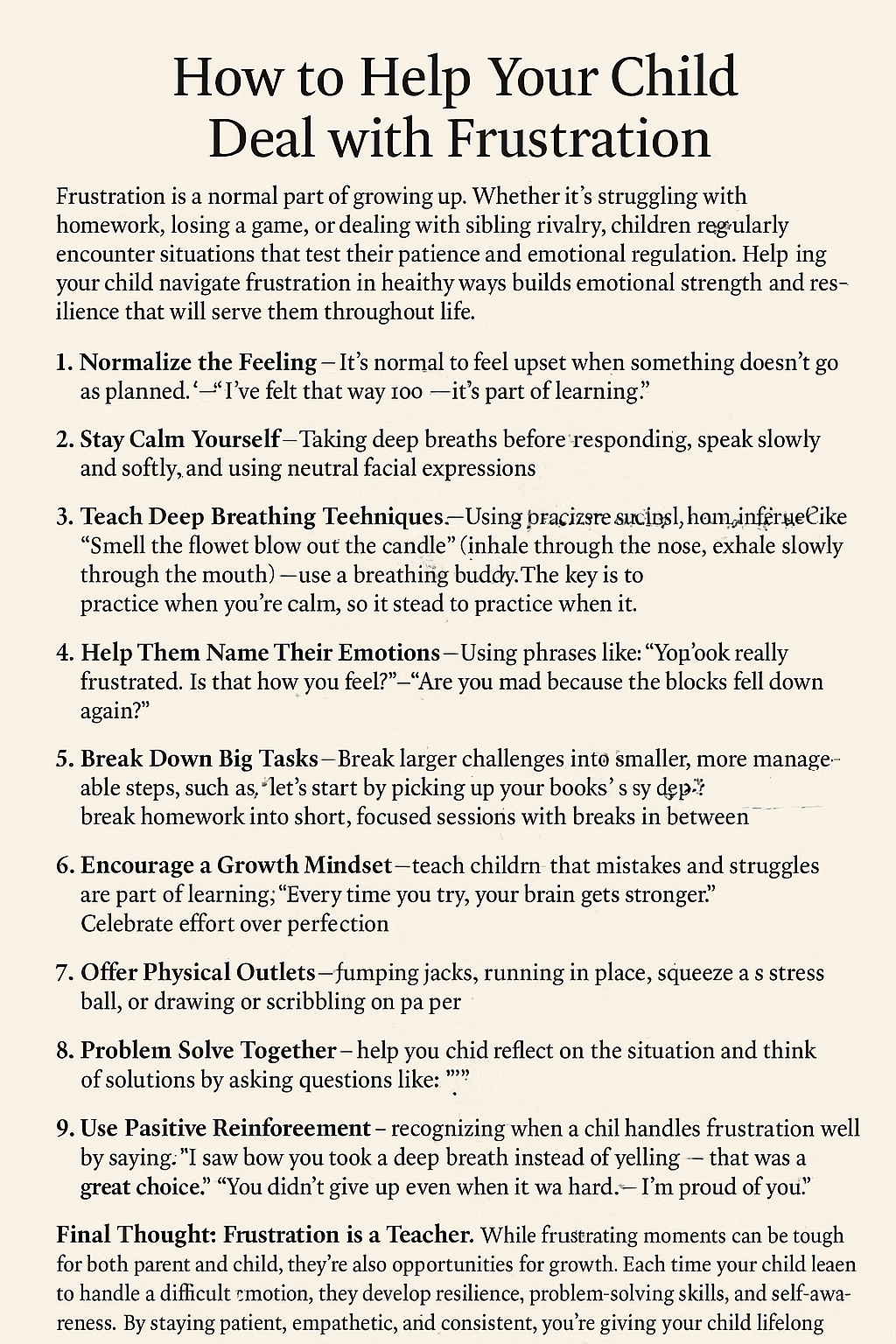Frustration is a normal part of growing up. Whether it’s struggling with homework, losing a game, or dealing with sibling rivalry, children regularly encounter situations that test their patience and emotional regulation. Helping your child navigate frustration in healthy ways builds emotional strength and resilience that will serve them throughout life.
Here are practical strategies for guiding your child through those tough, frustrating moments.
1. Normalize the Feeling
The first step in helping children deal with frustration is letting them know it’s okay to feel that way. Everyone gets frustrated — even adults.
Say things like:
- “It’s normal to feel upset when something doesn’t go as planned.”
- “I’ve felt that way too — it’s part of learning.”
Acknowledging their emotions without judgment helps them feel understood and safe.
2. Stay Calm Yourself
Your calmness acts as an anchor during your child’s emotional storm. If you respond with anger or panic, it will only escalate the situation.
Practice:
- Taking deep breaths before responding
- Speaking slowly and softly
- Using neutral facial expressions
When you stay calm, you model emotional control and provide a soothing presence.
3. Teach Deep Breathing Techniques
Simple breathing exercises can be powerful tools to help kids calm down when frustration hits.
Try this:
- “Smell the flower, blow out the candle” (inhale deeply through the nose, exhale slowly through the mouth)
- Use your fingers: trace up and down each finger while breathing in and out
- Create a breathing buddy (a stuffed animal that “breathes” with them)
The key is to practice when they’re calm, so it’s easier to use when they’re upset.
4. Help Them Name Their Emotions
Young children often act out because they can’t express what they’re feeling. Teaching them the language of emotions helps them identify and manage frustration more effectively.
Use phrases like:
- “You look really frustrated. Is that how you feel?”
- “Are you mad because the blocks fell down again?”
Labeling emotions reduces confusion and builds emotional intelligence.
5. Break Down Big Tasks
Frustration often stems from feeling overwhelmed. Help your child break larger challenges into smaller, more manageable steps.
For example:
- Instead of “clean your room,” say “let’s start by picking up your books.”
- Break homework into short, focused sessions with breaks in between.
Small successes reduce frustration and build confidence.
6. Encourage a Growth Mindset
Children who believe they can improve through effort are better equipped to handle frustration. Teach them that mistakes and struggles are part of learning.
Say things like:
- “Every time you try, your brain gets stronger.”
- “It’s okay to get it wrong — that’s how we learn.”
Celebrate effort over perfection.
7. Offer Physical Outlets
Frustration can build up as physical energy. Give your child a safe way to release it.
Ideas include:
- Jumping jacks
- Running in place
- Squeezing a stress ball
- Drawing or scribbling on paper
Physical activity helps regulate emotions and release tension.
8. Problem-Solve Together
Once your child has calmed down, help them reflect on the situation and think of solutions.
Ask:
- “What can we do differently next time?”
- “What would help this go better?”
- “Do you want to try again together?”
Problem-solving builds resilience and empowers your child to handle frustration more independently.
9. Use Positive Reinforcement
When your child handles frustration well — even a small improvement — recognize it.
Say:
- “I saw how you took a deep breath instead of yelling — that was a great choice.”
- “You didn’t give up even when it was hard — I’m proud of you.”
Reinforcing positive behavior makes it more likely to happen again.
10. Avoid Over-Rescuing
It’s tempting to fix everything for your child to avoid meltdowns, but stepping in too often can prevent them from learning how to cope.
Instead:
- Offer support without solving the problem for them
- Encourage them to try again
- Let natural consequences play out (within safe limits)
Struggles are growth opportunities — let them experience and learn from them.
Final Thought: Frustration is a Teacher
While frustrating moments can be tough for both parent and child, they’re also opportunities for growth. Each time your child learns to handle a difficult emotion, they develop resilience, problem-solving skills, and self-awareness.
By staying patient, empathetic, and consistent, you’re giving your child lifelong tools to manage frustration in healthy, constructive ways.
